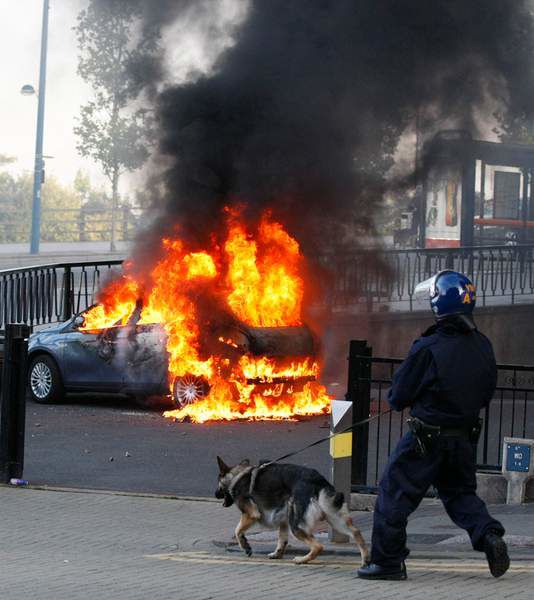Violence drops in London but flares elsewhere, taxing police
Published 5:00 am Wednesday, August 10, 2011

- A police dog and its handler patrol in Birmingham, England on Tuesday. Britain began flooding the streets of London and other cities with police Tuesday, as the nation feared its worst rioting in a generation would stretch into a fourth night.
LONDON — With 10,000 additional police officers deployed across London on Tuesday night, looting and arson dipped sharply from the anarchic scenes that shook Britain over the previous three days, even as violence ticked up again in several other major cities, including Birmingham, Manchester and Liverpool.
Hopes that the worst unrest in Britain in a generation had crested and begun to fall continued to weigh uneasily against fears that more robust police action might fail to put more than a temporary curb on the disorder. Sudden flare-ups continued in parts of London, with minor attacks reaching even into the upscale Knightsbridge shopping district, a major tourist draw.
With a decision not to call in the army, a step the government considered and dismissed Tuesday, the police force appeared to be stretched near its limit by what amounted to a risky shell game, with forces outside London sending their crack anti-riot units into the capital as reinforcements. One redeployed unit traveled from Manchester only hours before scores of youths stormed into that city’s center, setting fire to cars and buildings and looting shops.
A challenge for Cameron
The situation posed a daunting challenge for Prime Minister David Cameron, who returned overnight Monday from a vacation in Italy to take charge of what appeared to have been a faltering government reaction to the mayhem. He flew into a storm of criticism, from residents of the neighborhoods hit by the rioting and from others across a wide political spectrum who said that he should have acted sooner to crack down on the unrest.
Cameron had hesitated for two days to abandon his break at a villa in Tuscany as the looting and arson spread across London, and then to other cities, from its start in the Tottenham area in northeast London after Mark Duggan, 29, who was said by the police to have been a local gang member, was shot and killed by an officer last week.
On Tuesday, a police oversight body said that forensic tests had shown that both shots fired at the scene had come from a police officer’s Heckler and Koch submachine gun, and that the tests had so far shown no evidence that the loaded Italian-made BBM pistol carried by Duggan had been fired in the confrontation.
That account, by the Independent Police Complaints Commission, conflicted with the initial police account, which asserted that the police firearms unit had opened fire only after shots had been fired at the officers. But the commission’s spokeswoman, Rachel Cerfontyne, whose cautious handling of the incident reflected the commission’s concerns that it say nothing to inflame the violence, said that reports circulating in Tottenham and elsewhere that Duggan had been “executed” with shots to the head were false. He died, she said, from “a single gunshot wound to the chest,” and another to his arm.
For the moment, though, the circumstances of Duggan’s death appeared to be remote from the forces driving the riots, at least in the assessment of many of those who are most familiar with the neighborhoods affected. Community organizers, neighborhood residents and members of Parliament who represent the districts have said, overwhelmingly, that his death, while providing the original trigger for the violence, has had little or nothing to do with the looting and arson.
Labour leader weighs in
The theme was picked up on Tuesday by Ed Miliband, the Labour Party leader, who visited Peckham, one of the districts heavily damaged Monday night. “These people who have committed this violence do not speak for the people of Peckham,” he said. “And I don’t think they speak for the vast majority of people across this country.”
Speaking in Downing Street before visiting the south London neighborhood of Croydon, where a large furniture store was burned down and other properties were damaged Monday night, Cameron took a hard line on the unrest.
“This is criminality, pure and simple, and it has to be confronted and defeated,” he said. “People should be in no doubt that we will do everything necessary to restore order to Britain’s streets and to make them safe for the law-abiding.”






